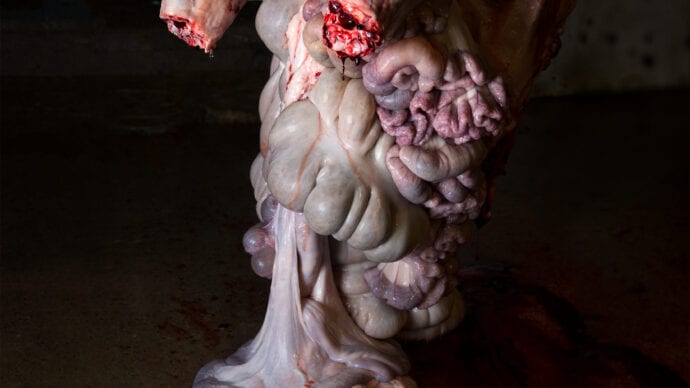Since he put out his first EP, Mutate Repeat Infinity, in 2016, experimental electro-pop artist Scott Hardware has shifted his attention inwards. And in order to make that change, he turned to angels. For his latest album, Engel, released earlier this month, Hardware was inspired by Wings of Desire, the 1987 German fantasy film by Wim Wenders in which angels live among people in Berlin, listening in on everyone’s thoughts, from the mundane to the existential. Hardware saw the film after moving back to Toronto after a year-and-a-half stint in the German capital. Nostalgia took hold, as Berlin was still looming large in his thoughts: He started imagining what it might look like if those angels were to descend on North America, coming to eavesdrop on everything he would have preferred to keep secret. “A lot of queer people’s thing is dealing with shame,” Hardware says. “I don’t want any [one] in my head. It’s about privacy. [The angels] became sort of a metaphor about being vulnerable in general. Do I want someone getting this close to me?” The album’s title track opens with the lines: “Here he comes before sleep / Here he comes to comfort me / But like a fly around my head / I’d sooner swat him dead.” In the world of Engel, a guardian figure overlaps with Hardware’s lover, and being protected and cared for comes with a hefty dose of resentment. These complex feelings play out over the metallic, industrial sounds of a boom-and-bust city like Berlin and are mirrored in the song’s arrangements, with an alternating melodic and deconstructed piano. The feeling of being scrutinized swells with a chorus of whispers and eventually fades with what sounds like the rustling of wings. The angels turn into a device that gives Hardware room to manoeuvre, helping him recontextualize his confessions and allowing for more freedom in the songwriting process. “If I was struggling with [writing], I would just imagine they’re eavesdropping. It’s not you ratting anybody out or revealing too much about yourself, it’s the angels eavesdropping,” he says. Wenders’ film is mostly shot in high-contrast black and white, with occasional bursts of colour; moments of lightness. Engel beautifully emulates this, sometimes within a single track. In “Millionaire,” Hardware moves between a ballad verse and breaks of industrial distortion. The juxtaposition makes it feel like darkness is lurking at the edges of his songs. Even in the upbeat tune called “Joy” that pulses to a disco rhythm we’re not hearing an account of happiness, but rather a determined pursuit of the elusive feeling. In keeping with his fears of shame and showing too much vulnerability, Hardware describes this song as “a sort of emotional stunting.” He explains: “I didn’t want to dip down [too low]. It has to do with keeping an amount of control over your emotionality, so basically you don’t feel the highs either.” By which he means, he’s never showing that soft underbelly that leaves his insides exposed. Though “Joy” might make you want to stand up and shake it, the track also contains lines like, “I make friends with everyone and carry them around like extra pounds.” Stark opposites exist in daily life, difficult feelings that can lie hidden within seemingly happy ones.
“Hardware threw all his favourite genres into the songwriting pot—from techno and pop to soul and disco.”
Though Hardware threw all his favourite genres into the songwriting pot—from techno and pop to soul and disco—he also wanted to expand the definition of electronic music, a vast genre he learned to love after moving to Berlin. It’s become foundational for him, partly because, he says, it “represents infinity in music making so I like to start there.” He enjoys pushing its boundaries by throwing a symphony or a piano ballad into the mix, too. Hardware’s first record took a more direct approach to addressing queer political issues and the HIV/AIDS crisis. Those themes haven’t disappeared entirely in his most recent album, though they have developed a more personal tinge. Engel ends on a track called “Survivor’s Guilt”—the only song on the album overtly tied to his previous themes. The effects of the HIV/AIDS crisis cycle through his thoughts more as an absence, something Hardware often sees lurking in the eyes of men who are 15 to 20 years older than him. The era of the epidemic keeps coming back to the musician’s mind in part because he feels like people his age are missing a “whole generation of men [who are] gone; artists, people who would have led the way.” These men may have acted a bit like angels, providing guidance.

For his cover art, Hardware opted for a painting by Chris Curreri that’s a visceral depiction of interiority. Hardware felt a kinship with Curreri’s piece and how it unabashedly displays what Hardware describes as an “everyday horror”—something that is meant to stay hidden but that we know is always just beneath the surface. Ultimately, Hardware says he allowed his deepest thoughts to be exposed in the album by asking himself, “Why do I care if I don’t have anything to hide?”


 Why you can trust Xtra
Why you can trust Xtra


